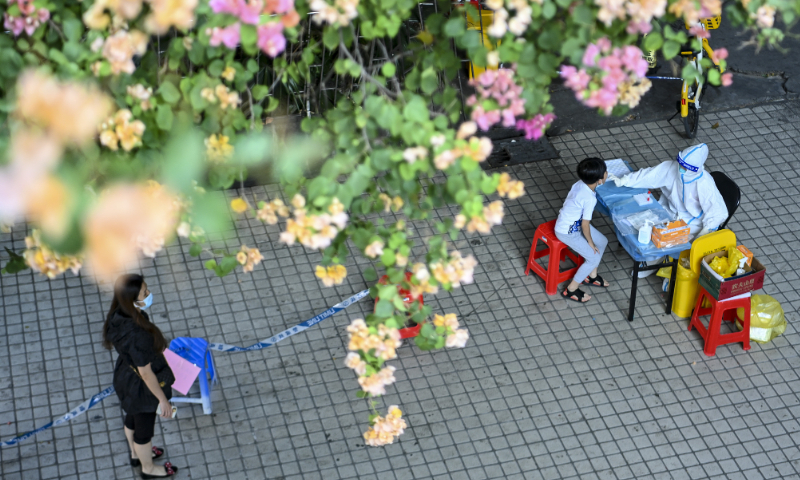
Residents take nucleic acid test of COVID-19 in Guangzhou, South China's Guangdong Province on October 29, 2022. Photo: VCG
The Chinese National Health Commission (NHC) stressed on Wednesday that the country must strive to control COVID-19 outbreaks with the minimum scale affected, and the shortest time and lowest cost possible, in a bid to correct mistakes from overly strict measures that have caused damage to people's properties and lives.
The Global Times found multiple regions in the country have vowed in recent days to implement precise epidemic controls so as to gradually restore the usual vitality of their cities.
The NHC said on Wednesday at a meeting that epidemic prevention and control must proceed prudently and delicately, while stressing that China is unswervingly adhering to the dynamic zero-COVID strategy by preventing the import of cases and internal rebounds.
Amid the NHC's call, multiple regions in China, including North China's Inner Mongolia Autonomous Region, Central China's Henan Province and Northwest China's Gansu Province, have vowed to put more emphasis on precise epidemic prevention.
Henan provincial governor Wang Kai said on Monday that scaled outbreaks must be curbed as soon as possible. He emphasized that risk areas should be categorized scientifically and precisely, with key areas and personnel strictly controlled while other places would be properly relaxed.
The province reported 35 confirmed local COVID-19 cases on Wednesday, according to the local health authority, all from its capital city Zhengzhou, and 141 local asymptomatic carriers, including 132 in Zhengzhou.
Zhengzhou's COVID-19 flare-up attracted wide public attention after Foxconn's factory in the city - the world's largest assembly plant for Apple's iPhones - was affected, with many workers reportedly leaving the park and walking home.
In response, official working groups were dispatched to guide epidemic prevention and control work at the plant. Foxconn vowed to ensure the safe return of employees who wished to go home.
Also on Monday, Gansu authorities stressed that epidemic prevention should not be over-simplified nor follow a one-size-fits-all approach. Relevant departments should enhance the capability of precise controls, and protect the livelihoods of the public with their heart and soul.
The authorities in Lanzhou, the capital city of Gansu, on Thursday published a briefing to respond to public inquiries after a 3-year-old child died of carbon monoxide poisoning, prompting online controversy as netizens suspected the tragedy might have been avoided if it were not for local epidemic control workers' delayed response and rigid work style.
In the Thursday briefing,
local authorities made public the full timeline of the incident, including the entire process from the time the community receiving report until the ambulance arriving on the scene. The city authorities vowed to seriously handle the problems exposed in the incident, including unsmooth first-aid mechanism, poor capabilities of emergency response and bureaucratic and officials with rigid work style.
"The NHC's meeting comes at a time when the epidemic prevention and control work in some places has drifted away from the country's original intention. It seemed that some local officials have taken epidemic prevention as their top priority so that they neglected other basic or urgent needs of the residents, thus put people's lives at risk. This must be corrected," Wang Guangfa, a Beijing-based respiratory expert, told the Global Times on Thursday.
Apart from an emphasis on precise controls, many places in China have relaxed nucleic acid test requirements for taking trains and airplanes.
Railway systems in South China's Guangxi Zhuang Autonomous Region announced on Tuesday that apart from passengers bound for Beijing, nucleic acid test results are no longer required for taking trains, but only health codes and temperature checks.
Zhanjiang in South China's Guangdong Province issued a similar notice.
The airport in Hefei, East China's Anhui Province, announced that starting from October 31, passengers departing from the airport will no longer need to show a negative COVID-19 test result. The airport reminded people that while the requirement has been lifted on departure, some destinations may still need the provision of nucleic acid tests upon arrival.
Wang said that the move was mainly meant to address the overall cost of epidemic prevention, as there have been many overlaps in checking nucleic acid tests, which is a waste of social resources.
The other reason for this new policy is that logistics are crucial in maintaining the normal operation of production and people's lives, as well as in maintaining effective and sustainable epidemic prevention. Excessive restrictions on the movement of people and goods can cause troubles in these aspects, Wang said.




